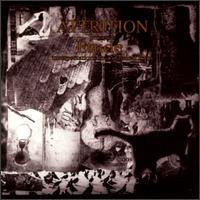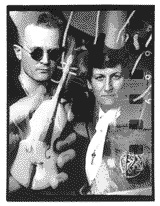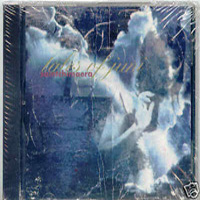 Attrition
Attrition
Étude (Projekt)
by Angela Dauthi
To make something new is neither easy nor is it even intended sometimes. But to make something sound new, ah, that is a goal to which every artist should aspire. Rehashing forms is standard practice for musicians (and some cynics even say that there is no longer any “new” music), but it should be obvious that no one wants it to sound rehashed. And sometimes, as is the case with Attrition, what they choose to borrow from is old enough that much of the population has forgotten the initial sound. On Étude, where old Attrition songs are reworked and reinterpreted, the instruments mainly consist of a string quartet or similar instrumentation, a smattering of percussion, and Julia Walker’s voice. Gothic chamber music is nothing new (Dead Can Dance did it years ago on Aion), and chamber music itself has existed for centuries. So what is Attrition’s new take? Étude doesn’t sound pretty.
 The difference comes in production. Rather than smooth everything out with reverb and subtle EQ mixings, Attrition make each instrument as raw as possible, as natural-sounding as they can make it. The violins and violas don’t have that shimmering, ghostly sound found on most other Gothic albums. You can hear the scrape of each string, every nuance of rough frequency, and, yes, a mistake every now and again. Even Julia, who usually hits every note perfectly, falters here and there. But that isn’t to say that Étude is sloppy, or even unprofessional. What they’re doing makes this album sound human. They sound as if they were in a sitting room, with a few spectators, creating a music that is both dark and haunting as well as organic and fresh. What I’m trying not to say is that it sounds like they’re in the room with you, but damnit, it does. Not some washed-out sounding piece of Gothic fluff, but a real, honest performance. There is more honesty here, more openness and vulnerability, and when the violins go into harmony, all the subtle tones that fight against each other are captured, not muffled by excessive reverb. There’s an old definition of the word “amateur” that has been forgotten. It comes from the root word amatus, to love. It means that the creator is doing it for the love of the music, not for a paycheck. Subsequently, the music has more emotional validity, more of a personal tie to the composer. That is what Attrition has done. Étude is a soul-ripping experience, awash in depth of feeling, heart-breaking in the purity of its sound. And these, too, are themes that have been made use of before. But Attrition makes it sound new.
The difference comes in production. Rather than smooth everything out with reverb and subtle EQ mixings, Attrition make each instrument as raw as possible, as natural-sounding as they can make it. The violins and violas don’t have that shimmering, ghostly sound found on most other Gothic albums. You can hear the scrape of each string, every nuance of rough frequency, and, yes, a mistake every now and again. Even Julia, who usually hits every note perfectly, falters here and there. But that isn’t to say that Étude is sloppy, or even unprofessional. What they’re doing makes this album sound human. They sound as if they were in a sitting room, with a few spectators, creating a music that is both dark and haunting as well as organic and fresh. What I’m trying not to say is that it sounds like they’re in the room with you, but damnit, it does. Not some washed-out sounding piece of Gothic fluff, but a real, honest performance. There is more honesty here, more openness and vulnerability, and when the violins go into harmony, all the subtle tones that fight against each other are captured, not muffled by excessive reverb. There’s an old definition of the word “amateur” that has been forgotten. It comes from the root word amatus, to love. It means that the creator is doing it for the love of the music, not for a paycheck. Subsequently, the music has more emotional validity, more of a personal tie to the composer. That is what Attrition has done. Étude is a soul-ripping experience, awash in depth of feeling, heart-breaking in the purity of its sound. And these, too, are themes that have been made use of before. But Attrition makes it sound new.



